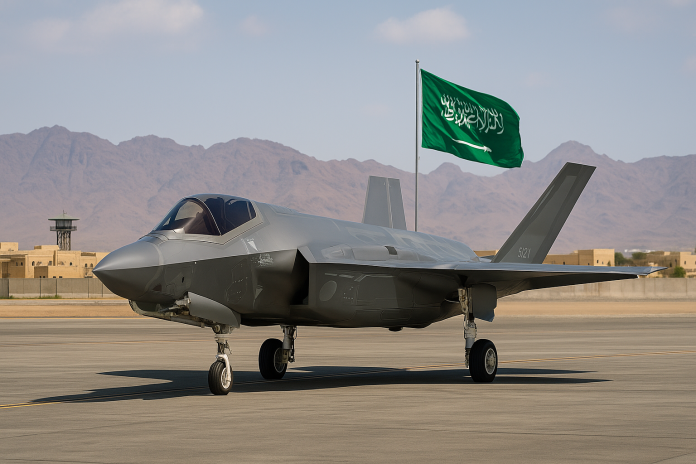
A proposed U.S. sale of F-35 fighter jets to Saudi Arabia is drawing renewed debate in Washington, where defense and intelligence officials are raising concerns about both regional stability and the protection of advanced military technology. According to reports based on assessments from the Defense Intelligence Agency, the deal could expose highly sensitive aircraft systems to China, which has expanded its security cooperation and ballistic-missile collaboration with Riyadh in recent years.
The Trump administration has been negotiating the sale of 48 F-35s, along with a mutual defense agreement, as part of a broader effort to deepen ties between Washington and Saudi Arabia. The arrangement could be worth billions of dollars to American arms manufacturers and is expected to feature prominently during Crown Prince Mohammed bin Salman’s upcoming visit to the White House.
However, U.S. officials familiar with the intelligence review say that the risk of Chinese access to the aircraft’s technology—whether through espionage or joint programs with Saudi Arabia—remains a core point of friction. Similar concerns emerged during the attempted sale of the aircraft to the United Arab Emirates in 2020. That deal stalled after the Biden administration sought strict safeguards, such as “kill switches” that could disable the jets if their security were compromised. UAE officials ultimately rejected those conditions, and the proposal collapsed.
The United States now faces the task of determining whether comparable protective measures can be placed on any agreement with Saudi Arabia. Pentagon officials have already signaled hesitation, and it remains unclear what restrictions might be attached to the final offer.
Beyond the issue of technology security, the sale also touches upon a longstanding American policy: preserving Israel’s qualitative military edge. Israel is the only Middle Eastern country currently operating the F-35 and has used the fighter jet in operations against Iranian targets in recent years. Since the 1973 war, U.S. administrations and Congress have maintained that Israel must be able to counter any “credible conventional military threat” in the region while minimizing losses.
Some Israeli officials fear that providing the same aircraft to Saudi Arabia—an actor with shifting strategic relationships and growing ties to Beijing—could erode this advantage. Previous efforts to advance diplomatic normalization between Saudi Arabia and Israel, pursued by both the Trump and Biden administrations, have stalled due to the ongoing Gaza conflict and disputes over Israeli policy toward Palestinians. With relations strained, Israeli leaders may be even more reluctant to support the sale.
For Saudi Arabia, acquiring the F-35 would strengthen its air force through advanced stealth capabilities and powerful sensor systems. Defense analysts point out that during Israel’s 2025 operation against Iranian defenses, the jet enabled older aircraft to fly missions with far fewer threats, demonstrating its value in contested airspace.
As the White House prepares for discussions with the crown prince, the administration faces pressure from multiple sides: the desire to maintain strong ties with Riyadh, the need to protect cutting-edge U.S. technologies, and the diplomatic imperative to preserve Israel’s military advantage. The outcome of the negotiations will shape U.S. relations in the region and determine how far Washington is willing to go in expanding defense cooperation with Saudi Arabia while managing its broader strategic concerns.
This image is the property of The New Dispatch LLC and is not licenseable for external use without explicit written permission.